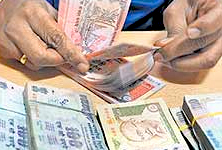 New Delhi, Aug 11: The Election Commission is turning the heat on political parties and candidates by insisting that they should not accept “anonymous donations,” thus restricting funding to MPs and MLAs depending on the limit during the elections.
New Delhi, Aug 11: The Election Commission is turning the heat on political parties and candidates by insisting that they should not accept “anonymous donations,” thus restricting funding to MPs and MLAs depending on the limit during the elections.
The fresh move is likely to come as a jolt to the parties which are resisting a right to information (RTI) scrutiny.
Earlier, the Supreme Court said in two separate verdicts that politicians who are in jail should not be allowed to contest elections and those convicted should be disqualified from Parliament and legislature.
These are a part of the Election Commission’s proposal recently submitted to the Law Commission of India, which is entrusted with bringing electoral reforms to plug poll malpractices and preventing use of black money. The Law Commission is collecting views from all stake holders, including political parties, on electoral reforms.
In the proposal, the Election Commission also said that like election expenditure cap on contestants, ceiling should be imposed on campaign expenditure by the parties.
The commission also said receiving of funds through sale of coupons by political parties should be accounted through the issue of proper receipts and maintenance of records.
It said maintenance of separate bank accounts by each contesting candidate for poll expenses should be made mandatory and any transaction above Rs 20,000 not done through dedicated bank account should be treated as not shown in books of accounts and therefore un-accounted both for political party and candidates.
Major suggestion
Another major suggestion made by the commission was a ceiling on campaign expenditure made by the parties for parliamentary and assembly elections. At present, there is no cap on expenditure made by political parties during campaign but there is a ceiling of Rs 40 lakh for each Lok Sabha contestant while it is Rs 16 lakh for each Assembly contestant.
“For the parties, it should be either a fraction (50 per cent) or not more than the expenditure ceiling limit provided for the candidate multiplied by the number of candidates of the party contesting the poll,” said the commission.
The amount of donation given to a candidate by a political party should not exceed the ceiling of expenditure prescribed for the election concerned. Star campaigners (leaders of political parties) should be restricted to 5 or 10 in total per party for by-elections.
Tax relief should be given only for the parties that contest election and win seats in Parliament/State Legislature. Maintenance of accounts by parties should be made compulsory and they should be audited by charted accountants. Audited accounts should be placed in public domain, the proposal added.





Comments
Add new comment